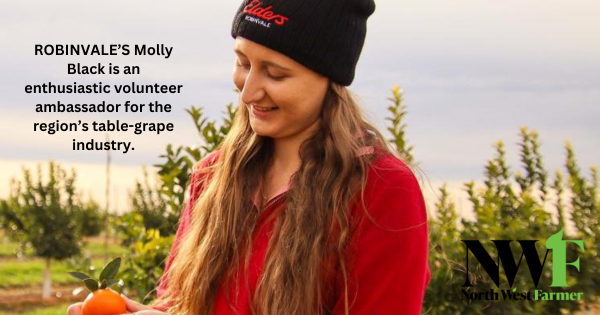ROBINVALE’S Molly Black is an enthusiastic volunteer ambassador for the region’s table-grape industry.
She has no hesitation talking it up to anyone who will listen, promising if you pass through any time between January and May, she will make sure you get some grapes.
“They’re like nothing you’ve ever tasted before,” Molly says.
Her new take on life comes after a pretty remarkable transformation.
She came from Orange, NSW, a predominantly pasture background where she made the grade for just the second intake in the Elders graduate agronomy program.
That was in 2016 and she joined the company pretty well convinced she would be broadacre based once she graduated. Her first six-month rotation, doing broadacre cropping, convinced her she was on the right career trajectory.
“I did six months’ work with broadacre under the program, and really loved it,” she says.
“Everything was clicking, and I was sure I would work in broadacre agronomy.”
But then a funny thing happened on the way to the office.
Molly says she was hesitant to step away from the broadacre program for her next rotation, but boy, did she get a serious surprise when she began working in the horticulture space.
“My first thoughts were, ‘Wow, this is such a challenge, I love this’.”
It did not take long for Molly to realise – and accept – her career would likely look a little different to how she’d imagined.
Molly is now a horticultural agronomist at Elders Robinvale, working alongside growers to boost the productivity of table grape, citrus and avocado crops.
“The best part of the job is working closely with growers, and seeing their whole year through,” Molly says.
“Seeing the product at the end of the year is the best feeling.
“You just feel so proud.”
Even better, her new world of horticulture is taking her a lot further than she might have dreamt when she tried to dodge that rotation during her graduate training.
She has just returned from a study tour to New Zealand with Corteva Agriscience – a trip she describes as having been “a fantastic way to progress our knowledge and skills”.
She says the tour proved “a valuable way to build relationships and share experiences to bring back to local growers”.
“New Zealand is doing some amazing things in its horticultural and viticultural sectors, but so are we in Australia.
“It just comes down to being able to exchange information and ideas to better both industries.
“I found it super educational to talk to the growers over there – it was interesting to compare similarities in the things we do and amazing to find out what is done differently.
“While my thing is table grapes, the places we visited, such as an apple orchard – which was basically an export business with similar target Asian markets – was an eye-opening operation.”
Molly credits the graduate agronomy program with helping her pursue her passion.
“I think that is one of the major benefits of the program, gaining exposure to the different industries, or sectors.
“I would never have had the exposure to horticulture without the program, or considered horticultural agronomy as a career path – and look at where I am now.”
Recently Molly has also had the opportunity to help mentor one of the new agronomy graduates, which she says has been a great challenge and very rewarding.
“You can’t just learn agronomy out of a textbook, you have to see the challenges in real time and solve the problem yourself,” she explains.
“It’s been great to be able to provide a new agronomist with that experience and mentorship based on the skillset and experiences I have gained in the industry.”
Elders’ graduate agronomy program participants go through two six-month rotations in the first year, focused on building a foundational understanding of crop segments and the fundamentals of being an agronomist at Elders.
This is followed by one 12-month rotation in the second year where graduates can specialise in a crop segment of their choice.
















